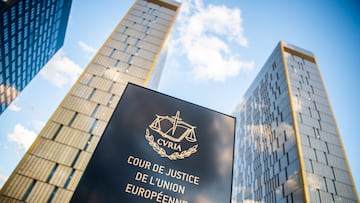ECJ rules in favour of European Super League: what is the project and what are its 10 principles?
The European Court of Justice has found that it is “unlawful” for FIFA and UEFA to punish clubs and players who join a European Super League.

The European Super League project has scored a major victory over FIFA and UEFA, after the European Court of Justice (ECJ) ruled that football’s world and European governing bodies are not within their rights to punish participants in a breakaway competition.
What did ECJ ruling say about Super League?
In a decision handed down on Thursday morning, the Luxembourg court said FIFA and UEFA are acting “contrary to competition law and the freedom to provide services” by attempting to prevent clubs and players from taking part in the Super League. “The FIFA and UEFA rules making any new interclub football project subject to their prior approval, such as the Super League, and prohibiting clubs and players from playing in those competitions, are unlawful,” the ECJ said.
The ECJ also noted, however, that its verdict “does not mean that a competition such as the Super League project must necessarily be approved”.

See also:
ECJ case comes after Spanish court challenge
The case had been brought before the ECJ after the European Super League Company and its promoters, the sports media firm A22, launched a legal challenge against UEFA and FIFA’s ability to ban participants in the Super League from playing in competitions organised by the two international authorities.
In January, a Madrid court found in the Super League’s favour, arguing that the governing bodies were “trying to sustain a monopoly”. However, this ruling was overturned on appeal, leading the Spanish court to refer the case to the ECJ.
Earlier this month, the ECJ’s advocate general, Athanasios Rantos, released a preliminary opinion which said that FIFA and UEFA were within their rights to sanction clubs and players who joined a rebel league, judging such actions “compatible with EU competition law”.
#ECJ: The #FIFA and #UEFA rules on prior approval of interclub #football competitions, such as the Super League, are contrary to #EUlaw #EuropeanSuperleague 👉 https://t.co/ATb3CgbPxg pic.twitter.com/XCnLzwIKWb
— EU Court of Justice (@EUCourtPress) December 21, 2023
What is the proposed European Super League?
The Super League was announced in April 2021 as a pan-European competition involving 20 teams, with 15 permanent members. Twelve clubs said they had signed up for the project as founding members: Real Madrid, Barcelona, Atlético Madrid, Arsenal, Chelsea, Tottenham, Manchester United, Manchester City, Liverpool, AC Milan, Inter Milan and Juventus. However, amid a fierce backlash to the project in the media and among fans, nine clubs - Atlético, Arsenal, Chelsea, Tottenham, United, City, Liverpool, Milan and Inter - quickly pulled out. In July this year, Juve then said they had “initiated the procedure” of withdrawing from the project, leaving Madrid and Barça as the only clubs steadfastly committed to the Super League.
In February, the Super League’s organisers proposed a revised format, introducing their “10 principles for a European football league”. A22 CEO Bernd Reichart explained that the project would instead be made up of 60 to 80 teams split into different divisions. Teams would qualify for the Super League based on their performances in domestic leagues, in which they would continue to compete (“broad and merit-based competitions” is principle number one, “domestic tournaments: the basis of football” is number two).
Related stories
Each participating club would be guaranteed a minimum of 14 matches per season, which would provide “stability and predictability of revenue”, while financial transparency (principle number five) is another key factor of the proposal: “Club spending must be based solely on the funds generated and not on competitively distorting capital injections.”
The “10 principles for a European football league”:
| The 10 principles of the European Super League |
| 1. Broad and merit-based competitions |
| 2. Domestic tournaments: the basis of football |
| 3. Improving competitiveness with stable and sustainable resources |
| 4. Player health must be at the heart of the game |
| 5. Club-run competitions with financial sustainability rules transparent and well applied |
| 6. The best football competition in the world |
| 7. Improving the fan experience |
| 8. Developing and funding women’s football |
|
9. Significantly increasing solidarity |
|
10. Respecting European Union law and values |
Why does Europe need the Super League, according to A22?
“European football is on the brink of the abyss,“ Reichart has claimed. “Huge imbalances have arisen across our continent and traditional European clubs, with a glorious past, today are unable to compete. [In October 2022] we started an open process of dialogue on the future of European football. Since then we have spoken with almost 50 clubs and other players in the sector and the conclusion shared by almost all of them is that the foundation on which European football is founded is seriously threatened. The time has come to make changes”.